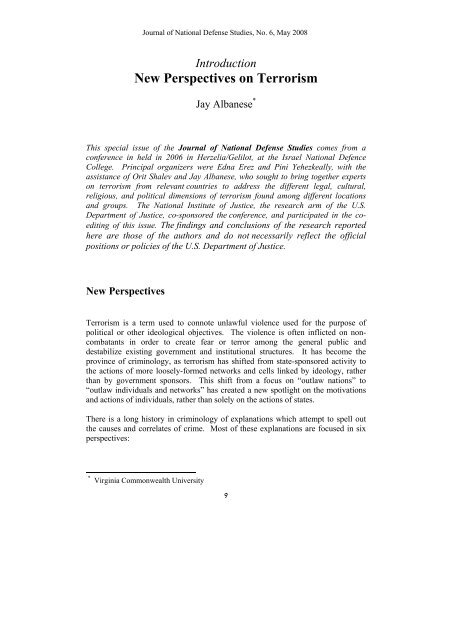222467to222472
222467to222472
222467to222472
You also want an ePaper? Increase the reach of your titles
YUMPU automatically turns print PDFs into web optimized ePapers that Google loves.
Journal of National Defense Studies, No. 6, May 2008<br />
Introduction<br />
New Perspectives on Terrorism<br />
Jay Albanese *<br />
This special issue of the Journal of National Defense Studies comes from a<br />
conference in held in 2006 in Herzelia/Gelilot, at the Israel National Defence<br />
College. Principal organizers were Edna Erez and Pini Yehezkeally, with the<br />
assistance of Orit Shalev and Jay Albanese, who sought to bring together experts<br />
on terrorism from relevant countries to address the different legal, cultural,<br />
religious, and political dimensions of terrorism found among different locations<br />
and groups. The National Institute of Justice, the research arm of the U.S.<br />
Department of Justice, co-sponsored the conference, and participated in the coediting<br />
of this issue. The findings and conclusions of the research reported<br />
here are those of the authors and do not necessarily reflect the official<br />
positions or policies of the U.S. Department of Justice.<br />
New Perspectives<br />
Terrorism is a term used to connote unlawful violence used for the purpose of<br />
political or other ideological objectives. The violence is often inflicted on noncombatants<br />
in order to create fear or terror among the general public and<br />
destabilize existing government and institutional structures. It has become the<br />
province of criminology, as terrorism has shifted from state-sponsored activity to<br />
the actions of more loosely-formed networks and cells linked by ideology, rather<br />
than by government sponsors. This shift from a focus on “outlaw nations” to<br />
“outlaw individuals and networks” has created a new spotlight on the motivations<br />
and actions of individuals, rather than solely on the actions of states.<br />
There is a long history in criminology of explanations which attempt to spell out<br />
the causes and correlates of crime. Most of these explanations are focused in six<br />
perspectives:<br />
* Virginia Commonwealth University<br />
9


